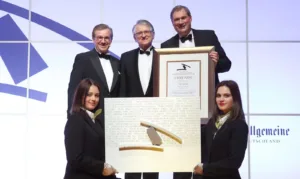Thinner than a human hair and yet so flexible that it can wrap around your little finger: Ultra-thin glass speeds up product innovations in the electronics and semiconductor industries, where it enables faster, more energy-efficient, and thinner devices.
SCHOTT, experts in the area of specialty glass, pioneered the thinnest, strongest ultra-thin glass available today, and the company’s ultra-thin glass portfolio has won this year’s German Industry Innovation Award in the large company category.
Dr. Frank Heinricht, SCHOTT’s Chairman of the Board of Management, received the award from EU Commissioner Guenther H. Oettinger and Nobel Laureate for Physics Prof. Dr. Klaus von Klitzung at a gala held in Darmstadt, Germany, on April 16.
“This award is a special honor for SCHOTT and confirmation of our intensive ongoing work on this visionary topic,” Heinricht noted. “The award underscores our success in bringing to market ultra-thin glass, a trailblazing technology for new applications. Though ultra-thin glass is made in Germany, it will inspire designers and engineers throughout North America and Asia to think in microns rather than inches or centimeters.”
SCHOTT, praised by the jury for the innovative power of ultra-thin glass, is at the forefront of the global value chain for the many industries that will utilize this material. Ultra-thin glass is being used in smartphone applications already, and its adoption is expected to grow across verticals worldwide.
Ultra-thin glass for the electronics of the future
SCHOTT’s robust and flexible ultra-thin glass is used in a variety of high-tech applications. The company produces ultra-thin glasses for innovative functions in the smartphones of tomorrow: from high-strength cover glasses to substrates for bendable OLED displays and wearables, for camera systems, novel micro batteries and advanced packaging of micro-electronics, as well as fingerprint and biosensors.
Thanks to a wide variety of high-quality glass types and SCHOTT’s proprietary down-draw technology, ultra-thin glasses have a minimum thickness of 25 micrometers yet are remarkably strong and can be reliably produced. The glasses are more robust than plastic and significantly more economical than silicon.
Building partnerships for the international semiconductor industry
Besides the traditional semiconductor industry, ultra-thin glass is also important for organic electronics. To build a production infrastructure for industrial processing, SCHOTT is partnering with a number of German development entities and important innovation centers, including the Fraunhofer Institutes FEP (Institute of Organic Electronics, Electron Beam and Plasma Technology) in Dresden and IZM (Institute for Reliability and Microintegration) in Berlin.
To support these efforts, the German Federal Ministry of Education and Research (BMBF) is funding advancements from SCHOTT and several of its partners jointly working to provide ultra-thin glass on a roll for organic electronics. Flexible, rolled electronics can support applications including touch sensors, displays, lighting components, organic solar cells, and intelligent labels. These elements, in turn, enable pioneering innovations in a wide range of consumer electronics, packaging, household appliances, and the automotive industry throughout the world.
In the United States, SCHOTT is participating in Georgia Tech’s Open Innovation Center. This industrial consortium is conducting research on glass-based interposers for applications in the area of flexible electronics.

